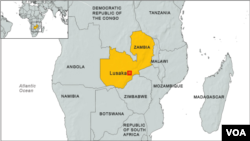“Everything happened so fast," said Lesa Kasoma. “From nowhere I was grabbed in my jeans, somebody held my shirt, and they were advising each other, ‘Let’s pull her inside where there’s no one; there’s too much attention outside here.’”
Kasoma is owner of a radio station in Zambia's capital, Lusaka. The station was suspended for unspecified "unprofessional conduct" in April, during the run up to Zambia's tense presidential election. She had gone to the station Wednesday after authorities said she had permission to reopen.
There, she ran into two police officers.
"I screamed for help; they kicked my legs and I fell down, they started dragging me by my hair, trying to pull me inside, they started kicking me, started beating me up, and they were just doing that in my ribs. And these police officers grabbed my bra, to the extent that it even cut my breasts, [they] were so painful as they pulled me, and I caught his hand and beat him.”
Police have now charged Kasoma with assaulting an officer — something she denies, though she said she defended herself.
The incident is one of several suggesting that political tension continues in Zambia in the aftermath of President Edgar Lungu's re-election.
The same day, police arrested the nation’s top opposition leaders and charged them with sedition over their claims that August’s presidential poll was unfair.
Opposition leader Hakainde Hichilema and his deputy, Geoffrey Mwamba, were released on bail; dozens of their supporters were also arrested.
In a statement, Hichilema denied the charges, going further to describe them as “laughable — utter nonsense, stupid.”
Turmoil unusual for Zambia
Analyst Dimpho Motsamai of the Pretoria-based Institute for Security Studies said this sort of turmoil is new for Zambia, a nation that has a long history of peaceful transfers of political power and multi-party democracy.
“It’s a very important development in Zambia,” she said. “And it is worrisome in some circles, for the simple reason that it can create an impression that there is kind of a political witch-hunting on the part of the president in dealing with someone who has challenged his legitimacy.”
Zambia’s information minister did not answer repeated calls seeking comment. Nor has President Edgar Lungu made any statements or public calls for dialogue.
Chilufya Tayali, founder of the new Movement for Economic Development and Equity, told VOA he does not think Zambia is in a crisis — yet — but said he is concerned about the implications of recent events.
“There is no investor who wants to invest in a country that is not stable,” he said. “There is no investor who is looking to invest in a country that does not respect human rights. There is no investor that is looking at investing in a country where the opposition is not given that freedom of expression, freedom of movement.”
Kasoma said her station will remain closed until she is well enough to collect her transmitter, which was confiscated.
She said the scariest thing about her assault was not its suddenness or its brutality. What scared her the most, she said, was that she yelled for help and watched the confused faces of the many people around her. Kasoma said she thinks they were asking themselves: "who can we call for help when the people who would help are the ones doing this?"




